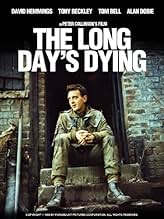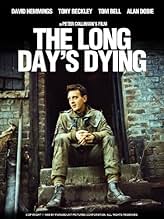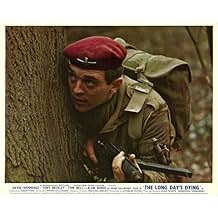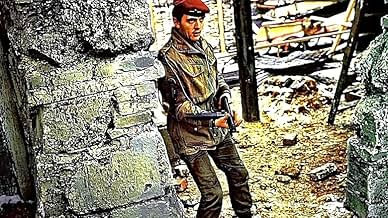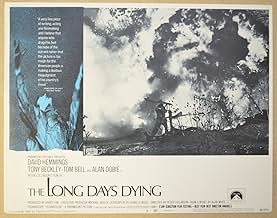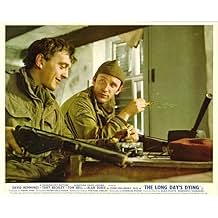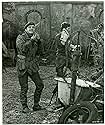IMDb RATING
6.5/10
549
YOUR RATING
The saga of three British soldiers and their German captive as they trek through the European countryside.The saga of three British soldiers and their German captive as they trek through the European countryside.The saga of three British soldiers and their German captive as they trek through the European countryside.
- Awards
- 2 wins total
- Director
- Writers
- All cast & crew
- Production, box office & more at IMDbPro
Featured reviews
I saw this film prior to joining the British Army. I went through my basic training, at first difficult and then as I progressed much easier. My time was spent during the height of the troubles in NI and the cold war. There was times when I questioned myself on what I had gotten myself into, not for long, as the training would always take over and you would always react instinctively. The voice over used to display what the soldiers are thinking is spot on, though I would have added breathing and heart rate as this seems to pound in your ear drums in given situations. Some years later I was in Canada for a family get together. An Aunty of mine who lives in the USA and is a lecturer at the Columbus Uni Ohio had done a paper on the effects of the British Army in NI. She spent some time out there researching. Although an ex pat she was very anti-British. She made a bee line for me and condemned me for being a British soldier. My only answer was see the film 'A long day's dying'. It's the closest a civilian will get to realise why a soldier does what he does. The answer is right at the end.
10Lackary
The reason why I say this is because I wrote the screenplay and knew very little about it being made until I was asked to see the film. I wrote it for some producers who sold it on without telling me. Because Alan Dobie was a friend of mine, I got to hear about it. I had only written a first draft so I was understandably worried when I heard that it was on the floor. I asked Peter Collinson, through my agent, whether he might like me to do another draft. I also asked if I could I see my original script because I had lost it. I was told, too late. So I did the only thing I could do under the circumstances and took my name off. I had no idea what they might have done to my screenplay. Then I was invited to see the finished film. I was so impressed that I very quickly asked to have my name put back on. It's a beautifully made piece, from a hurriedly written first draft, I expected to be asked to do much more work on it; perhaps if I had it wouldn't be so good. I would love to see my original script again if anybody knows where it is? I would also love to see the film again, I only saw it once in a little viewing theatre in Soho.
Surprise, it was released on Historia (French counterpart of the History Channel) Of course it was dubbed in French, but it did not lose any of its suspense, almost claustrophobic atmosphere. The paratroopers were third-dimensional in character and even the German prisoner seemed believable ! Not the all good for our side and all bad for the enemy kind of script ! Excellent ! Would compete well with today's movies like Pearl Harbour, etc. etc. !
This is not a movie you watch for entertainment, at least most people I know would not.
It's portraits the cruelty to both body and mind that happen in a war pretty well, the characters seem plausible, especially because you "read their minds", something more often found in books and rarely in movies, however done very well in this piece. I would place it next to "All quiet on the western front" and "Die Brücke" in terms of leaving a lasting impression.
I wish I could screen it at school, along with the other two movies - however finding a copy of it showed to be pretty hard - which is a shame.
It's portraits the cruelty to both body and mind that happen in a war pretty well, the characters seem plausible, especially because you "read their minds", something more often found in books and rarely in movies, however done very well in this piece. I would place it next to "All quiet on the western front" and "Die Brücke" in terms of leaving a lasting impression.
I wish I could screen it at school, along with the other two movies - however finding a copy of it showed to be pretty hard - which is a shame.
I first read the book, when I was a young teenager, then saw the film late one night. About a year ago I checked it out on IMDb and discovered no copies available. I then hit the web and found a site that offers War Films, soooo glad that I did, ordered a copy and sat back and was able to confirm why I wanted to see it again.
In my opinion to really enjoy the film I suggest you read get a copy of the book and then watch the film. The book is no longer in print but I did track a copy down via E-bay, the Author Alan White was a commando/paratrooper during the 2nd world war taking part in disparate clandestine operations and this was his first book. It is written by someone who knows and this fact I believe gives the book and film authenticity. I have not given the film a ten only because of the nature of the ending of the film, not as good as the book. There are a couple of plot lines that differ from the book also, which is strange as the book is not about the large scale nature of war but about the individual in war. The film illustrates this exceptionally well. I have the copy of the book to let my son read and then the film to let him watch, in that order.
If you can track it down the book and the film then it is definitely worth it and I only wish that it was more readily available for more to read and see, one of my all best war films, ever!
In my opinion to really enjoy the film I suggest you read get a copy of the book and then watch the film. The book is no longer in print but I did track a copy down via E-bay, the Author Alan White was a commando/paratrooper during the 2nd world war taking part in disparate clandestine operations and this was his first book. It is written by someone who knows and this fact I believe gives the book and film authenticity. I have not given the film a ten only because of the nature of the ending of the film, not as good as the book. There are a couple of plot lines that differ from the book also, which is strange as the book is not about the large scale nature of war but about the individual in war. The film illustrates this exceptionally well. I have the copy of the book to let my son read and then the film to let him watch, in that order.
If you can track it down the book and the film then it is definitely worth it and I only wish that it was more readily available for more to read and see, one of my all best war films, ever!
Did you know
- TriviaThis was produced on a deceptively low budget. Prodicer Michael Deeley on his memoirs says that it cost between £150,000 and £200,000.
- ConnectionsReferenced in The Making of 'The Italian Job' (2003)
Details
- Release date
- Country of origin
- Language
- Also known as
- Le commando des maudits
- Filming locations
- Production company
- See more company credits at IMDbPro
- Runtime
- 1h 35m(95 min)
- Sound mix
- Aspect ratio
- 2.35 : 1
Contribute to this page
Suggest an edit or add missing content

